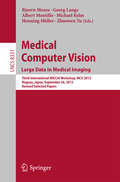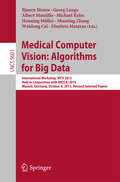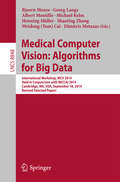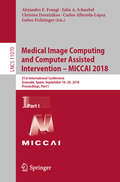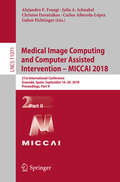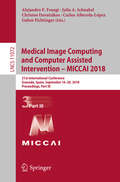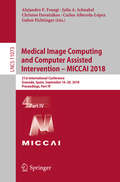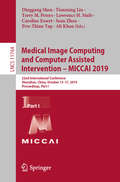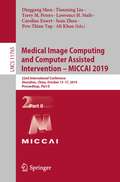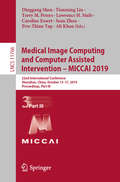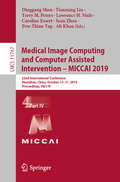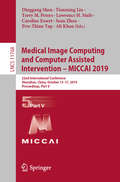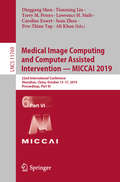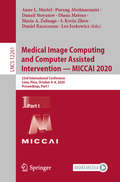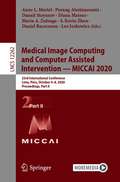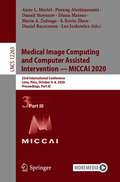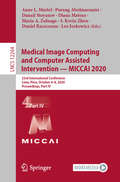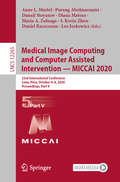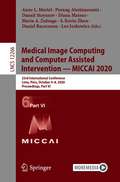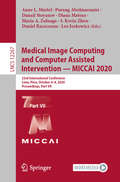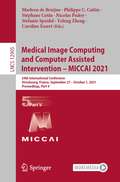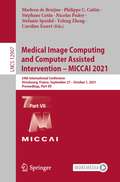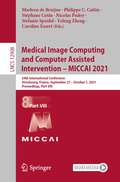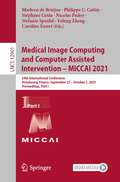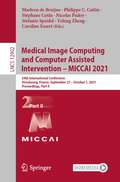- Table View
- List View
Medical Computer Vision. Large Data in Medical Imaging: Third International MICCAI Workshop, MCV 2013, Nagoya, Japan, September 26, 2013, Revised Selected Papers (Lecture Notes in Computer Science #8331)
by Bjoern Menze, Georg Langs, Albert Montillo, Michael Kelm, Henning Müller and Zhuowen TuThis book constitutes the thoroughly refereed post-workshop proceedings of the Third International Workshop on Medical Computer Vision, MCV 2013, held in Nagoya, Japan, in September 2013 in conjunction with the 16th International Conference on Medical Image Computing and Computer-Assisted Intervention, MICCAI 2013. The 7 revised full papers and 12 poster papers presented were selected from 25 submissions. They have been organized in topical sections on registration and visualization, segmentation, detection and localization, and features and retrieval. In addition, the volume contains two invited papers describing segmentation task and data set of the VISCERAL benchmark challenge.
Medical Computer Vision: Algorithms for Big Data
by Henning Müller Georg Langs Bjoern Menze Albert Montillo Michael Kelm Shaoting Zhang Weidong Cai Dimitris MetaxasThis book constitutes the thoroughly refereed prost-workshop proceedings of the International Workshop on Medical Computer Vision: Algorithms for Big Data, MCS 2015, held in Munich, Germany, in October 2015, held in conjunction with the 18th International Conference on Medical Image Computing and Computer-Assisted Intervention, MICCAI 2015. The workshop shows well the current trends and tendencies in medical computer vision and how the techniques can be used in clinical work and on large data sets. It is organized in the following sections: predicting disease; atlas exploitation and avoidance; machine learning based analyses; advanced methods for image analysis; poster sessions. The 10 full, 5 short, 1 invited papers and one overview paper presented in this volume were carefully reviewed and selected from 22 submissions.
Medical Computer Vision: Algorithms for Big Data
by Henning Müller Georg Langs Bjoern Menze Albert Montillo Michael Kelm Shaoting Zhang Dimitris Metaxas Weidong Tom CaiThis book constitutes the thoroughly refereed post-workshop proceedings of the International Workshop on Medical Computer Vision: Algorithms for Big Data, MCV 2014, held in Cambridge, MA, USA, in September 2019, in conjunction with the 17th International Conference on Medical Image Computing and Computer-Assisted Intervention, MICCAI 2014. The one-day workshop aimed at exploring the use of modern computer vision technology and "big data" algorithms in tasks such as automatic segmentation and registration, localization of anatomical features and detection of anomalies emphasizing questions of harvesting, organizing and learning from large-scale medical imaging data sets and general-purpose automatic understanding of medical images. The 18 full and 1 short papers presented in this volume were carefully reviewed and selected from 30 submission.
Medical Image Computing and Computer Assisted Intervention – MICCAI 2018: 21st International Conference, Granada, Spain, September 16-20, 2018, Proceedings, Part I (Lecture Notes in Computer Science #11070)
by Alejandro F. Frangi Gabor Fichtinger Julia A. Schnabel Christos Davatzikos Carlos Alberola-LópezThe four-volume set LNCS 11070, 11071, 11072, and 11073 constitutes the refereed proceedings of the 21st International Conference on Medical Image Computing and Computer-Assisted Intervention, MICCAI 2018, held in Granada, Spain, in September 2018. The 373 revised full papers presented were carefully reviewed and selected from 1068 submissions in a double-blind review process. The papers have been organized in the following topical sections: Part I: Image Quality and Artefacts; Image Reconstruction Methods; Machine Learning in Medical Imaging; Statistical Analysis for Medical Imaging; Image Registration Methods. Part II: Optical and Histology Applications: Optical Imaging Applications; Histology Applications; Microscopy Applications; Optical Coherence Tomography and Other Optical Imaging Applications. Cardiac, Chest and Abdominal Applications: Cardiac Imaging Applications: Colorectal, Kidney and Liver Imaging Applications; Lung Imaging Applications; Breast Imaging Applications; Other Abdominal Applications. Part III: Diffusion Tensor Imaging and Functional MRI: Diffusion Tensor Imaging; Diffusion Weighted Imaging; Functional MRI; Human Connectome. Neuroimaging and Brain Segmentation Methods: Neuroimaging; Brain Segmentation Methods.Part IV: Computer Assisted Intervention: Image Guided Interventions and Surgery; Surgical Planning, Simulation and Work Flow Analysis; Visualization and Augmented Reality. Image Segmentation Methods: General Image Segmentation Methods, Measures and Applications; Multi-Organ Segmentation; Abdominal Segmentation Methods; Cardiac Segmentation Methods; Chest, Lung and Spine Segmentation; Other Segmentation Applications.
Medical Image Computing and Computer Assisted Intervention – MICCAI 2018: 21st International Conference, Granada, Spain, September 16-20, 2018, Proceedings, Part II (Lecture Notes in Computer Science #11071)
by Alejandro F. Frangi Gabor Fichtinger Julia A. Schnabel Christos Davatzikos Carlos Alberola-LópezThe four-volume set LNCS 11070, 11071, 11072, and 11073 constitutes the refereed proceedings of the 21st International Conference on Medical Image Computing and Computer-Assisted Intervention, MICCAI 2018, held in Granada, Spain, in September 2018. The 373 revised full papers presented were carefully reviewed and selected from 1068 submissions in a double-blind review process. The papers have been organized in the following topical sections: Part I: Image Quality and Artefacts; Image Reconstruction Methods; Machine Learning in Medical Imaging; Statistical Analysis for Medical Imaging; Image Registration Methods. Part II: Optical and Histology Applications: Optical Imaging Applications; Histology Applications; Microscopy Applications; Optical Coherence Tomography and Other Optical Imaging Applications. Cardiac, Chest and Abdominal Applications: Cardiac Imaging Applications: Colorectal, Kidney and Liver Imaging Applications; Lung Imaging Applications; Breast Imaging Applications; Other Abdominal Applications. Part III: Diffusion Tensor Imaging and Functional MRI: Diffusion Tensor Imaging; Diffusion Weighted Imaging; Functional MRI; Human Connectome. Neuroimaging and Brain Segmentation Methods: Neuroimaging; Brain Segmentation Methods.Part IV: Computer Assisted Intervention: Image Guided Interventions and Surgery; Surgical Planning, Simulation and Work Flow Analysis; Visualization and Augmented Reality. Image Segmentation Methods: General Image Segmentation Methods, Measures and Applications; Multi-Organ Segmentation; Abdominal Segmentation Methods; Cardiac Segmentation Methods; Chest, Lung and Spine Segmentation; Other Segmentation Applications.
Medical Image Computing and Computer Assisted Intervention – MICCAI 2018: 21st International Conference, Granada, Spain, September 16-20, 2018, Proceedings, Part III (Lecture Notes in Computer Science #11072)
by Alejandro F. Frangi Gabor Fichtinger Julia A. Schnabel Christos Davatzikos Carlos Alberola-LópezThe four-volume set LNCS 11070, 11071, 11072, and 11073 constitutes the refereed proceedings of the 21st International Conference on Medical Image Computing and Computer-Assisted Intervention, MICCAI 2018, held in Granada, Spain, in September 2018. The 373 revised full papers presented were carefully reviewed and selected from 1068 submissions in a double-blind review process. The papers have been organized in the following topical sections: Part I: Image Quality and Artefacts; Image Reconstruction Methods; Machine Learning in Medical Imaging; Statistical Analysis for Medical Imaging; Image Registration Methods. Part II: Optical and Histology Applications: Optical Imaging Applications; Histology Applications; Microscopy Applications; Optical Coherence Tomography and Other Optical Imaging Applications. Cardiac, Chest and Abdominal Applications: Cardiac Imaging Applications: Colorectal, Kidney and Liver Imaging Applications; Lung Imaging Applications; Breast Imaging Applications; Other Abdominal Applications. Part III: Diffusion Tensor Imaging and Functional MRI: Diffusion Tensor Imaging; Diffusion Weighted Imaging; Functional MRI; Human Connectome. Neuroimaging and Brain Segmentation Methods: Neuroimaging; Brain Segmentation Methods.Part IV: Computer Assisted Intervention: Image Guided Interventions and Surgery; Surgical Planning, Simulation and Work Flow Analysis; Visualization and Augmented Reality. Image Segmentation Methods: General Image Segmentation Methods, Measures and Applications; Multi-Organ Segmentation; Abdominal Segmentation Methods; Cardiac Segmentation Methods; Chest, Lung and Spine Segmentation; Other Segmentation Applications.
Medical Image Computing and Computer Assisted Intervention – MICCAI 2018: 21st International Conference, Granada, Spain, September 16-20, 2018, Proceedings, Part IV (Lecture Notes in Computer Science #11073)
by Alejandro F. Frangi Gabor Fichtinger Julia A. Schnabel Christos Davatzikos Carlos Alberola-LópezThe four-volume set LNCS 11070, 11071, 11072, and 11073 constitutes the refereed proceedings of the 21st International Conference on Medical Image Computing and Computer-Assisted Intervention, MICCAI 2018, held in Granada, Spain, in September 2018. The 373 revised full papers presented were carefully reviewed and selected from 1068 submissions in a double-blind review process. The papers have been organized in the following topical sections: Part I: Image Quality and Artefacts; Image Reconstruction Methods; Machine Learning in Medical Imaging; Statistical Analysis for Medical Imaging; Image Registration Methods. Part II: Optical and Histology Applications: Optical Imaging Applications; Histology Applications; Microscopy Applications; Optical Coherence Tomography and Other Optical Imaging Applications. Cardiac, Chest and Abdominal Applications: Cardiac Imaging Applications: Colorectal, Kidney and Liver Imaging Applications; Lung Imaging Applications; Breast Imaging Applications; Other Abdominal Applications. Part III: Diffusion Tensor Imaging and Functional MRI: Diffusion Tensor Imaging; Diffusion Weighted Imaging; Functional MRI; Human Connectome. Neuroimaging and Brain Segmentation Methods: Neuroimaging; Brain Segmentation Methods.Part IV: Computer Assisted Intervention: Image Guided Interventions and Surgery; Surgical Planning, Simulation and Work Flow Analysis; Visualization and Augmented Reality. Image Segmentation Methods: General Image Segmentation Methods, Measures and Applications; Multi-Organ Segmentation; Abdominal Segmentation Methods; Cardiac Segmentation Methods; Chest, Lung and Spine Segmentation; Other Segmentation Applications.
Medical Image Computing and Computer Assisted Intervention – MICCAI 2019: 22nd International Conference, Shenzhen, China, October 13–17, 2019, Proceedings, Part I (Lecture Notes in Computer Science #11764)
by Ali Khan Pew-Thian Yap Dinggang Shen Terry M. Peters Tianming Liu Lawrence H. Staib Caroline Essert Sean ZhouThe six-volume set LNCS 11764, 11765, 11766, 11767, 11768, and 11769 constitutes the refereed proceedings of the 22nd International Conference on Medical Image Computing and Computer-Assisted Intervention, MICCAI 2019, held in Shenzhen, China, in October 2019. The 539 revised full papers presented were carefully reviewed and selected from 1730 submissions in a double-blind review process. The papers are organized in the following topical sections: Part I: optical imaging; endoscopy; microscopy. Part II: image segmentation; image registration; cardiovascular imaging; growth, development, atrophy and progression. Part III: neuroimage reconstruction and synthesis; neuroimage segmentation; diffusion weighted magnetic resonance imaging; functional neuroimaging (fMRI); miscellaneous neuroimaging. Part IV: shape; prediction; detection and localization; machine learning; computer-aided diagnosis; image reconstruction and synthesis. Part V: computer assisted interventions; MIC meets CAI. Part VI: computed tomography; X-ray imaging.
Medical Image Computing and Computer Assisted Intervention – MICCAI 2019: 22nd International Conference, Shenzhen, China, October 13–17, 2019, Proceedings, Part II (Lecture Notes in Computer Science #11765)
by Ali Khan Pew-Thian Yap Dinggang Shen Terry M. Peters Tianming Liu Lawrence H. Staib Caroline Essert Sean ZhouThe six-volume set LNCS 11764, 11765, 11766, 11767, 11768, and 11769 constitutes the refereed proceedings of the 22nd International Conference on Medical Image Computing and Computer-Assisted Intervention, MICCAI 2019, held in Shenzhen, China, in October 2019. The 539 revised full papers presented were carefully reviewed and selected from 1730 submissions in a double-blind review process. The papers are organized in the following topical sections: Part I: optical imaging; endoscopy; microscopy. Part II: image segmentation; image registration; cardiovascular imaging; growth, development, atrophy and progression. Part III: neuroimage reconstruction and synthesis; neuroimage segmentation; diffusion weighted magnetic resonance imaging; functional neuroimaging (fMRI); miscellaneous neuroimaging. Part IV: shape; prediction; detection and localization; machine learning; computer-aided diagnosis; image reconstruction and synthesis. Part V: computer assisted interventions; MIC meets CAI. Part VI: computed tomography; X-ray imaging.
Medical Image Computing and Computer Assisted Intervention – MICCAI 2019: 22nd International Conference, Shenzhen, China, October 13–17, 2019, Proceedings, Part III (Lecture Notes in Computer Science #11766)
by Ali Khan Pew-Thian Yap Dinggang Shen Terry M. Peters Tianming Liu Lawrence H. Staib Caroline Essert Sean ZhouThe six-volume set LNCS 11764, 11765, 11766, 11767, 11768, and 11769 constitutes the refereed proceedings of the 22nd International Conference on Medical Image Computing and Computer-Assisted Intervention, MICCAI 2019, held in Shenzhen, China, in October 2019. The 539 revised full papers presented were carefully reviewed and selected from 1730 submissions in a double-blind review process. The papers are organized in the following topical sections: Part I: optical imaging; endoscopy; microscopy. Part II: image segmentation; image registration; cardiovascular imaging; growth, development, atrophy and progression. Part III: neuroimage reconstruction and synthesis; neuroimage segmentation; diffusion weighted magnetic resonance imaging; functional neuroimaging (fMRI); miscellaneous neuroimaging. Part IV: shape; prediction; detection and localization; machine learning; computer-aided diagnosis; image reconstruction and synthesis. Part V: computer assisted interventions; MIC meets CAI. Part VI: computed tomography; X-ray imaging.
Medical Image Computing and Computer Assisted Intervention – MICCAI 2019: 22nd International Conference, Shenzhen, China, October 13–17, 2019, Proceedings, Part IV (Lecture Notes in Computer Science #11767)
by Ali Khan Pew-Thian Yap Dinggang Shen Terry M. Peters Tianming Liu Lawrence H. Staib Caroline Essert Sean ZhouThe six-volume set LNCS 11764, 11765, 11766, 11767, 11768, and 11769 constitutes the refereed proceedings of the 22nd International Conference on Medical Image Computing and Computer-Assisted Intervention, MICCAI 2019, held in Shenzhen, China, in October 2019. The 539 revised full papers presented were carefully reviewed and selected from 1730 submissions in a double-blind review process. The papers are organized in the following topical sections: Part I: optical imaging; endoscopy; microscopy. Part II: image segmentation; image registration; cardiovascular imaging; growth, development, atrophy and progression. Part III: neuroimage reconstruction and synthesis; neuroimage segmentation; diffusion weighted magnetic resonance imaging; functional neuroimaging (fMRI); miscellaneous neuroimaging. Part IV: shape; prediction; detection and localization; machine learning; computer-aided diagnosis; image reconstruction and synthesis. Part V: computer assisted interventions; MIC meets CAI. Part VI: computed tomography; X-ray imaging.
Medical Image Computing and Computer Assisted Intervention – MICCAI 2019: 22nd International Conference, Shenzhen, China, October 13–17, 2019, Proceedings, Part V (Lecture Notes in Computer Science #11768)
by Ali Khan Pew-Thian Yap Dinggang Shen Terry M. Peters Tianming Liu Lawrence H. Staib Caroline Essert Sean ZhouThe six-volume set LNCS 11764, 11765, 11766, 11767, 11768, and 11769 constitutes the refereed proceedings of the 22nd International Conference on Medical Image Computing and Computer-Assisted Intervention, MICCAI 2019, held in Shenzhen, China, in October 2019. The 539 revised full papers presented were carefully reviewed and selected from 1730 submissions in a double-blind review process. The papers are organized in the following topical sections: Part I: optical imaging; endoscopy; microscopy.Part II: image segmentation; image registration; cardiovascular imaging; growth, development, atrophy and progression.Part III: neuroimage reconstruction and synthesis; neuroimage segmentation; diffusion weighted magnetic resonance imaging; functional neuroimaging (fMRI); miscellaneous neuroimaging.Part IV: shape; prediction; detection and localization; machine learning; computer-aided diagnosis; image reconstruction and synthesis.Part V: computer assisted interventions; MIC meets CAI. Part VI: computed tomography; X-ray imaging.
Medical Image Computing and Computer Assisted Intervention – MICCAI 2019: 22nd International Conference, Shenzhen, China, October 13–17, 2019, Proceedings, Part VI (Lecture Notes in Computer Science #11769)
by Ali Khan Pew-Thian Yap Dinggang Shen Terry M. Peters Tianming Liu Lawrence H. Staib Caroline Essert Sean ZhouThe six-volume set LNCS 11764, 11765, 11766, 11767, 11768, and 11769 constitutes the refereed proceedings of the 22nd International Conference on Medical Image Computing and Computer-Assisted Intervention, MICCAI 2019, held in Shenzhen, China, in October 2019. The 539 revised full papers presented were carefully reviewed and selected from 1730 submissions in a double-blind review process. The papers are organized in the following topical sections: Part I: optical imaging; endoscopy; microscopy.Part II: image segmentation; image registration; cardiovascular imaging; growth, development, atrophy and progression.Part III: neuroimage reconstruction and synthesis; neuroimage segmentation; diffusion weighted magnetic resonance imaging; functional neuroimaging (fMRI); miscellaneous neuroimaging.Part IV: shape; prediction; detection and localization; machine learning; computer-aided diagnosis; image reconstruction and synthesis.Part V: computer assisted interventions; MIC meets CAI. Part VI: computed tomography; X-ray imaging.
Medical Image Computing and Computer Assisted Intervention – MICCAI 2020: 23rd International Conference, Lima, Peru, October 4–8, 2020, Proceedings, Part I (Lecture Notes in Computer Science #12261)
by Leo Joskowicz Diana Mateus Maria A. Zuluaga Danail Stoyanov Daniel Racoceanu Purang Abolmaesumi Anne L. Martel S. Kevin ZhouThe seven-volume set LNCS 12261, 12262, 12263, 12264, 12265, 12266, and 12267 constitutes the refereed proceedings of the 23rd International Conference on Medical Image Computing and Computer-Assisted Intervention, MICCAI 2020, held in Lima, Peru, in October 2020. The conference was held virtually due to the COVID-19 pandemic.The 542 revised full papers presented were carefully reviewed and selected from 1809 submissions in a double-blind review process. The papers are organized in the following topical sections: Part I: machine learning methodologies Part II: image reconstruction; prediction and diagnosis; cross-domain methods and reconstruction; domain adaptation; machine learning applications; generative adversarial networks Part III: CAI applications; image registration; instrumentation and surgical phase detection; navigation and visualization; ultrasound imaging; video image analysis Part IV: segmentation; shape models and landmark detection Part V: biological, optical, microscopic imaging; cell segmentation and stain normalization; histopathology image analysis; opthalmology Part VI: angiography and vessel analysis; breast imaging; colonoscopy; dermatology; fetal imaging; heart and lung imaging; musculoskeletal imaging Part VI: brain development and atlases; DWI and tractography; functional brain networks; neuroimaging; positron emission tomography
Medical Image Computing and Computer Assisted Intervention – MICCAI 2020: 23rd International Conference, Lima, Peru, October 4–8, 2020, Proceedings, Part II (Lecture Notes in Computer Science #12262)
by Leo Joskowicz Diana Mateus Maria A. Zuluaga Danail Stoyanov Daniel Racoceanu Purang Abolmaesumi Anne L. Martel S. Kevin ZhouThe seven-volume set LNCS 12261, 12262, 12263, 12264, 12265, 12266, and 12267 constitutes the refereed proceedings of the 23rd International Conference on Medical Image Computing and Computer-Assisted Intervention, MICCAI 2020, held in Lima, Peru, in October 2020. The conference was held virtually due to the COVID-19 pandemic.The 542 revised full papers presented were carefully reviewed and selected from 1809 submissions in a double-blind review process. The papers are organized in the following topical sections: Part I: machine learning methodologies Part II: image reconstruction; prediction and diagnosis; cross-domain methods and reconstruction; domain adaptation; machine learning applications; generative adversarial networks Part III: CAI applications; image registration; instrumentation and surgical phase detection; navigation and visualization; ultrasound imaging; video image analysis Part IV: segmentation; shape models and landmark detection Part V: biological, optical, microscopic imaging; cell segmentation and stain normalization; histopathology image analysis; opthalmology Part VI: angiography and vessel analysis; breast imaging; colonoscopy; dermatology; fetal imaging; heart and lung imaging; musculoskeletal imaging Part VI: brain development and atlases; DWI and tractography; functional brain networks; neuroimaging; positron emission tomography
Medical Image Computing and Computer Assisted Intervention – MICCAI 2020: 23rd International Conference, Lima, Peru, October 4–8, 2020, Proceedings, Part III (Lecture Notes in Computer Science #12263)
by Leo Joskowicz Diana Mateus Maria A. Zuluaga Danail Stoyanov Daniel Racoceanu Purang Abolmaesumi Anne L. Martel S. Kevin ZhouThe seven-volume set LNCS 12261, 12262, 12263, 12264, 12265, 12266, and 12267 constitutes the refereed proceedings of the 23rd International Conference on Medical Image Computing and Computer-Assisted Intervention, MICCAI 2020, held in Lima, Peru, in October 2020. The conference was held virtually due to the COVID-19 pandemic.The 542 revised full papers presented were carefully reviewed and selected from 1809 submissions in a double-blind review process. The papers are organized in the following topical sections: Part I: machine learning methodologies Part II: image reconstruction; prediction and diagnosis; cross-domain methods and reconstruction; domain adaptation; machine learning applications; generative adversarial networks Part III: CAI applications; image registration; instrumentation and surgical phase detection; navigation and visualization; ultrasound imaging; video image analysis Part IV: segmentation; shape models and landmark detection Part V: biological, optical, microscopic imaging; cell segmentation and stain normalization; histopathology image analysis; opthalmology Part VI: angiography and vessel analysis; breast imaging; colonoscopy; dermatology; fetal imaging; heart and lung imaging; musculoskeletal imaging Part VI: brain development and atlases; DWI and tractography; functional brain networks; neuroimaging; positron emission tomography
Medical Image Computing and Computer Assisted Intervention – MICCAI 2020: 23rd International Conference, Lima, Peru, October 4–8, 2020, Proceedings, Part IV (Lecture Notes in Computer Science #12264)
by Leo Joskowicz Diana Mateus Maria A. Zuluaga Danail Stoyanov Daniel Racoceanu Purang Abolmaesumi Anne L. Martel S. Kevin ZhouThe seven-volume set LNCS 12261, 12262, 12263, 12264, 12265, 12266, and 12267 constitutes the refereed proceedings of the 23rd International Conference on Medical Image Computing and Computer-Assisted Intervention, MICCAI 2020, held in Lima, Peru, in October 2020. The conference was held virtually due to the COVID-19 pandemic.The 542 revised full papers presented were carefully reviewed and selected from 1809 submissions in a double-blind review process. The papers are organized in the following topical sections: Part I: machine learning methodologies Part II: image reconstruction; prediction and diagnosis; cross-domain methods and reconstruction; domain adaptation; machine learning applications; generative adversarial networks Part III: CAI applications; image registration; instrumentation and surgical phase detection; navigation and visualization; ultrasound imaging; video image analysis Part IV: segmentation; shape models and landmark detection Part V: biological, optical, microscopic imaging; cell segmentation and stain normalization; histopathology image analysis; opthalmology Part VI: angiography and vessel analysis; breast imaging; colonoscopy; dermatology; fetal imaging; heart and lung imaging; musculoskeletal imaging Part VI: brain development and atlases; DWI and tractography; functional brain networks; neuroimaging; positron emission tomography
Medical Image Computing and Computer Assisted Intervention – MICCAI 2020: 23rd International Conference, Lima, Peru, October 4–8, 2020, Proceedings, Part V (Lecture Notes in Computer Science #12265)
by Leo Joskowicz Diana Mateus Maria A. Zuluaga Danail Stoyanov Daniel Racoceanu Purang Abolmaesumi Anne L. Martel S. Kevin ZhouThe seven-volume set LNCS 12261, 12262, 12263, 12264, 12265, 12266, and 12267 constitutes the refereed proceedings of the 23rd International Conference on Medical Image Computing and Computer-Assisted Intervention, MICCAI 2020, held in Lima, Peru, in October 2020. The conference was held virtually due to the COVID-19 pandemic. The 542 revised full papers presented were carefully reviewed and selected from 1809 submissions in a double-blind review process. The papers are organized in the following topical sections: Part I: machine learning methodologies Part II: image reconstruction; prediction and diagnosis; cross-domain methods and reconstruction; domain adaptation; machine learning applications; generative adversarial networks Part III: CAI applications; image registration; instrumentation and surgical phase detection; navigation and visualization; ultrasound imaging; video image analysis Part IV: segmentation; shape models and landmark detection Part V: biological, optical, microscopic imaging; cell segmentation and stain normalization; histopathology image analysis; opthalmology Part VI: angiography and vessel analysis; breast imaging; colonoscopy; dermatology; fetal imaging; heart and lung imaging; musculoskeletal imaging Part VI: brain development and atlases; DWI and tractography; functional brain networks; neuroimaging; positron emission tomography
Medical Image Computing and Computer Assisted Intervention – MICCAI 2020: 23rd International Conference, Lima, Peru, October 4–8, 2020, Proceedings, Part VI (Lecture Notes in Computer Science #12266)
by Leo Joskowicz Diana Mateus Maria A. Zuluaga Danail Stoyanov Daniel Racoceanu Purang Abolmaesumi Anne L. Martel S. Kevin ZhouThe seven-volume set LNCS 12261, 12262, 12263, 12264, 12265, 12266, and 12267 constitutes the refereed proceedings of the 23rd International Conference on Medical Image Computing and Computer-Assisted Intervention, MICCAI 2020, held in Lima, Peru, in October 2020. The conference was held virtually due to the COVID-19 pandemic. The 542 revised full papers presented were carefully reviewed and selected from 1809 submissions in a double-blind review process. The papers are organized in the following topical sections: Part I: machine learning methodologies Part II: image reconstruction; prediction and diagnosis; cross-domain methods and reconstruction; domain adaptation; machine learning applications; generative adversarial networks Part III: CAI applications; image registration; instrumentation and surgical phase detection; navigation and visualization; ultrasound imaging; video image analysis Part IV: segmentation; shape models and landmark detection Part V: biological, optical, microscopic imaging; cell segmentation and stain normalization; histopathology image analysis; opthalmology Part VI: angiography and vessel analysis; breast imaging; colonoscopy; dermatology; fetal imaging; heart and lung imaging; musculoskeletal imaging Part VI: brain development and atlases; DWI and tractography; functional brain networks; neuroimaging; positron emission tomography
Medical Image Computing and Computer Assisted Intervention – MICCAI 2020: 23rd International Conference, Lima, Peru, October 4–8, 2020, Proceedings, Part VII (Lecture Notes in Computer Science #12267)
by Leo Joskowicz Diana Mateus Maria A. Zuluaga Danail Stoyanov Daniel Racoceanu Purang Abolmaesumi Anne L. Martel S. Kevin ZhouThe seven-volume set LNCS 12261, 12262, 12263, 12264, 12265, 12266, and 12267 constitutes the refereed proceedings of the 23rd International Conference on Medical Image Computing and Computer-Assisted Intervention, MICCAI 2020, held in Lima, Peru, in October 2020. The conference was held virtually due to the COVID-19 pandemic. The 542 revised full papers presented were carefully reviewed and selected from 1809 submissions in a double-blind review process. The papers are organized in the following topical sections: Part I: machine learning methodologies Part II: image reconstruction; prediction and diagnosis; cross-domain methods and reconstruction; domain adaptation; machine learning applications; generative adversarial networks Part III: CAI applications; image registration; instrumentation and surgical phase detection; navigation and visualization; ultrasound imaging; video image analysis Part IV: segmentation; shape models and landmark detection Part V: biological, optical, microscopic imaging; cell segmentation and stain normalization; histopathology image analysis; opthalmology Part VI: angiography and vessel analysis; breast imaging; colonoscopy; dermatology; fetal imaging; heart and lung imaging; musculoskeletal imaging Part VI: brain development and atlases; DWI and tractography; functional brain networks; neuroimaging; positron emission tomography
Medical Image Computing and Computer Assisted Intervention – MICCAI 2021: 24th International Conference, Strasbourg, France, September 27 – October 1, 2021, Proceedings, Part V (Lecture Notes in Computer Science #12905)
by Yefeng Zheng Stéphane Cotin Caroline Essert Stefanie Speidel Philippe C. Cattin Marleen De Bruijne Nicolas PadoyThe eight-volume set LNCS 12901, 12902, 12903, 12904, 12905, 12906, 12907, and 12908 constitutes the refereed proceedings of the 24th International Conference on Medical Image Computing and Computer-Assisted Intervention, MICCAI 2021, held in Strasbourg, France, in September/October 2021.*The 542 revised full papers presented were carefully reviewed and selected from 1809 submissions in a double-blind review process. The papers are organized in the following topical sections: Part I: image segmentation Part II: machine learning - self-supervised learning; machine learning - semi-supervised learning; and machine learning - weakly supervised learning Part III: machine learning - advances in machine learning theory; machine learning - domain adaptation; machine learning - federated learning; machine learning - interpretability / explainability; and machine learning - uncertainty Part IV: image registration; image-guided interventions and surgery; surgical data science; surgical planning and simulation; surgical skill and work flow analysis; and surgical visualization and mixed, augmented and virtual reality Part V: computer aided diagnosis; integration of imaging with non-imaging biomarkers; and outcome/disease prediction Part VI: image reconstruction; clinical applications - cardiac; and clinical applications - vascular Part VII: clinical applications - abdomen; clinical applications - breast; clinical applications - dermatology; clinical applications - fetal imaging; clinical applications - lung; clinical applications - neuroimaging - brain development; clinical applications - neuroimaging - DWI and tractography; clinical applications - neuroimaging - functional brain networks; clinical applications - neuroimaging – others; and clinical applications - oncology Part VIII: clinical applications - ophthalmology; computational (integrative) pathology; modalities - microscopy; modalities - histopathology; and modalities - ultrasound*The conference was held virtually.
Medical Image Computing and Computer Assisted Intervention – MICCAI 2021: 24th International Conference, Strasbourg, France, September 27 – October 1, 2021, Proceedings, Part VII (Lecture Notes in Computer Science #12907)
by Yefeng Zheng Stéphane Cotin Caroline Essert Stefanie Speidel Philippe C. Cattin Marleen De Bruijne Nicolas PadoyThe eight-volume set LNCS 12901, 12902, 12903, 12904, 12905, 12906, 12907, and 12908 constitutes the refereed proceedings of the 24th International Conference on Medical Image Computing and Computer-Assisted Intervention, MICCAI 2021, held in Strasbourg, France, in September/October 2021.*The 542 revised full papers presented were carefully reviewed and selected from 1809 submissions in a double-blind review process. The papers are organized in the following topical sections: Part I: image segmentation Part II: machine learning - self-supervised learning; machine learning - semi-supervised learning; and machine learning - weakly supervised learning Part III: machine learning - advances in machine learning theory; machine learning - domain adaptation; machine learning - federated learning; machine learning - interpretability / explainability; and machine learning - uncertainty Part IV: image registration; image-guided interventions and surgery; surgical data science; surgical planning and simulation; surgical skill and work flow analysis; and surgical visualization and mixed, augmented and virtual reality Part V: computer aided diagnosis; integration of imaging with non-imaging biomarkers; and outcome/disease prediction Part VI: image reconstruction; clinical applications - cardiac; and clinical applications - vascular Part VII: clinical applications - abdomen; clinical applications - breast; clinical applications - dermatology; clinical applications - fetal imaging; clinical applications - lung; clinical applications - neuroimaging - brain development; clinical applications - neuroimaging - DWI and tractography; clinical applications - neuroimaging - functional brain networks; clinical applications - neuroimaging – others; and clinical applications - oncology Part VIII: clinical applications - ophthalmology; computational (integrative) pathology; modalities - microscopy; modalities - histopathology; and modalities - ultrasound*The conference was held virtually.
Medical Image Computing and Computer Assisted Intervention – MICCAI 2021: 24th International Conference, Strasbourg, France, September 27 – October 1, 2021, Proceedings, Part VIII (Lecture Notes in Computer Science #12908)
by Yefeng Zheng Stéphane Cotin Caroline Essert Stefanie Speidel Philippe C. Cattin Marleen De Bruijne Nicolas PadoyThe eight-volume set LNCS 12901, 12902, 12903, 12904, 12905, 12906, 12907, and 12908 constitutes the refereed proceedings of the 24th International Conference on Medical Image Computing and Computer-Assisted Intervention, MICCAI 2021, held in Strasbourg, France, in September/October 2021.*The 542 revised full papers presented were carefully reviewed and selected from 1809 submissions in a double-blind review process. The papers are organized in the following topical sections: Part I: image segmentation Part II: machine learning - self-supervised learning; machine learning - semi-supervised learning; and machine learning - weakly supervised learning Part III: machine learning - advances in machine learning theory; machine learning - domain adaptation; machine learning - federated learning; machine learning - interpretability / explainability; and machine learning - uncertainty Part IV: image registration; image-guided interventions and surgery; surgical data science; surgical planning and simulation; surgical skill and work flow analysis; and surgical visualization and mixed, augmented and virtual reality Part V: computer aided diagnosis; integration of imaging with non-imaging biomarkers; and outcome/disease prediction Part VI: image reconstruction; clinical applications - cardiac; and clinical applications - vascular Part VII: clinical applications - abdomen; clinical applications - breast; clinical applications - dermatology; clinical applications - fetal imaging; clinical applications - lung; clinical applications - neuroimaging - brain development; clinical applications - neuroimaging - DWI and tractography; clinical applications - neuroimaging - functional brain networks; clinical applications - neuroimaging – others; and clinical applications - oncology Part VIII: clinical applications - ophthalmology; computational (integrative) pathology; modalities - microscopy; modalities - histopathology; and modalities - ultrasound*The conference was held virtually.
Medical Image Computing and Computer Assisted Intervention – MICCAI 2021: 24th International Conference, Strasbourg, France, September 27–October 1, 2021, Proceedings, Part I (Lecture Notes in Computer Science #12901)
by Yefeng Zheng Stéphane Cotin Caroline Essert Stefanie Speidel Philippe C. Cattin Marleen De Bruijne Nicolas PadoyThe eight-volume set LNCS 12901, 12902, 12903, 12904, 12905, 12906, 12907, and 12908 constitutes the refereed proceedings of the 24th International Conference on Medical Image Computing and Computer-Assisted Intervention, MICCAI 2021, held in Strasbourg, France, in September/October 2021.*The 542 revised full papers presented were carefully reviewed and selected from 1809 submissions in a double-blind review process. The papers are organized in the following topical sections: Part I: image segmentation Part II: machine learning - self-supervised learning; machine learning - semi-supervised learning; and machine learning - weakly supervised learning Part III: machine learning - advances in machine learning theory; machine learning - domain adaptation; machine learning - federated learning; machine learning - interpretability / explainability; and machine learning - uncertainty Part IV: image registration; image-guided interventions and surgery; surgical data science; surgical planning and simulation; surgical skill and work flow analysis; and surgical visualization and mixed, augmented and virtual reality Part V: computer aided diagnosis; integration of imaging with non-imaging biomarkers; and outcome/disease prediction Part VI: image reconstruction; clinical applications - cardiac; and clinical applications - vascular Part VII: clinical applications - abdomen; clinical applications - breast; clinical applications - dermatology; clinical applications - fetal imaging; clinical applications - lung; clinical applications - neuroimaging - brain development; clinical applications - neuroimaging - DWI and tractography; clinical applications - neuroimaging - functional brain networks; clinical applications - neuroimaging – others; and clinical applications - oncology Part VIII: clinical applications - ophthalmology; computational (integrative) pathology; modalities - microscopy; modalities - histopathology; and modalities - ultrasound*The conference was held virtually.
Medical Image Computing and Computer Assisted Intervention – MICCAI 2021: 24th International Conference, Strasbourg, France, September 27–October 1, 2021, Proceedings, Part II (Lecture Notes in Computer Science #12902)
by Yefeng Zheng Stéphane Cotin Caroline Essert Stefanie Speidel Philippe C. Cattin Marleen De Bruijne Nicolas PadoyThe eight-volume set LNCS 12901, 12902, 12903, 12904, 12905, 12906, 12907, and 12908 constitutes the refereed proceedings of the 24th International Conference on Medical Image Computing and Computer-Assisted Intervention, MICCAI 2021, held in Strasbourg, France, in September/October 2021.*The 542 revised full papers presented were carefully reviewed and selected from 1809 submissions in a double-blind review process. The papers are organized in the following topical sections: Part I: image segmentation Part II: machine learning - self-supervised learning; machine learning - semi-supervised learning; and machine learning - weakly supervised learning Part III: machine learning - advances in machine learning theory; machine learning - domain adaptation; machine learning - federated learning; machine learning - interpretability / explainability; and machine learning - uncertainty Part IV: image registration; image-guided interventions and surgery; surgical data science; surgical planning and simulation; surgical skill and work flow analysis; and surgical visualization and mixed, augmented and virtual reality Part V: computer aided diagnosis; integration of imaging with non-imaging biomarkers; and outcome/disease prediction Part VI: image reconstruction; clinical applications - cardiac; and clinical applications - vascular Part VII: clinical applications - abdomen; clinical applications - breast; clinical applications - dermatology; clinical applications - fetal imaging; clinical applications - lung; clinical applications - neuroimaging - brain development; clinical applications - neuroimaging - DWI and tractography; clinical applications - neuroimaging - functional brain networks; clinical applications - neuroimaging – others; and clinical applications - oncology Part VIII: clinical applications - ophthalmology; computational (integrative) pathology; modalities - microscopy; modalities - histopathology; and modalities - ultrasound*The conference was held virtually.
